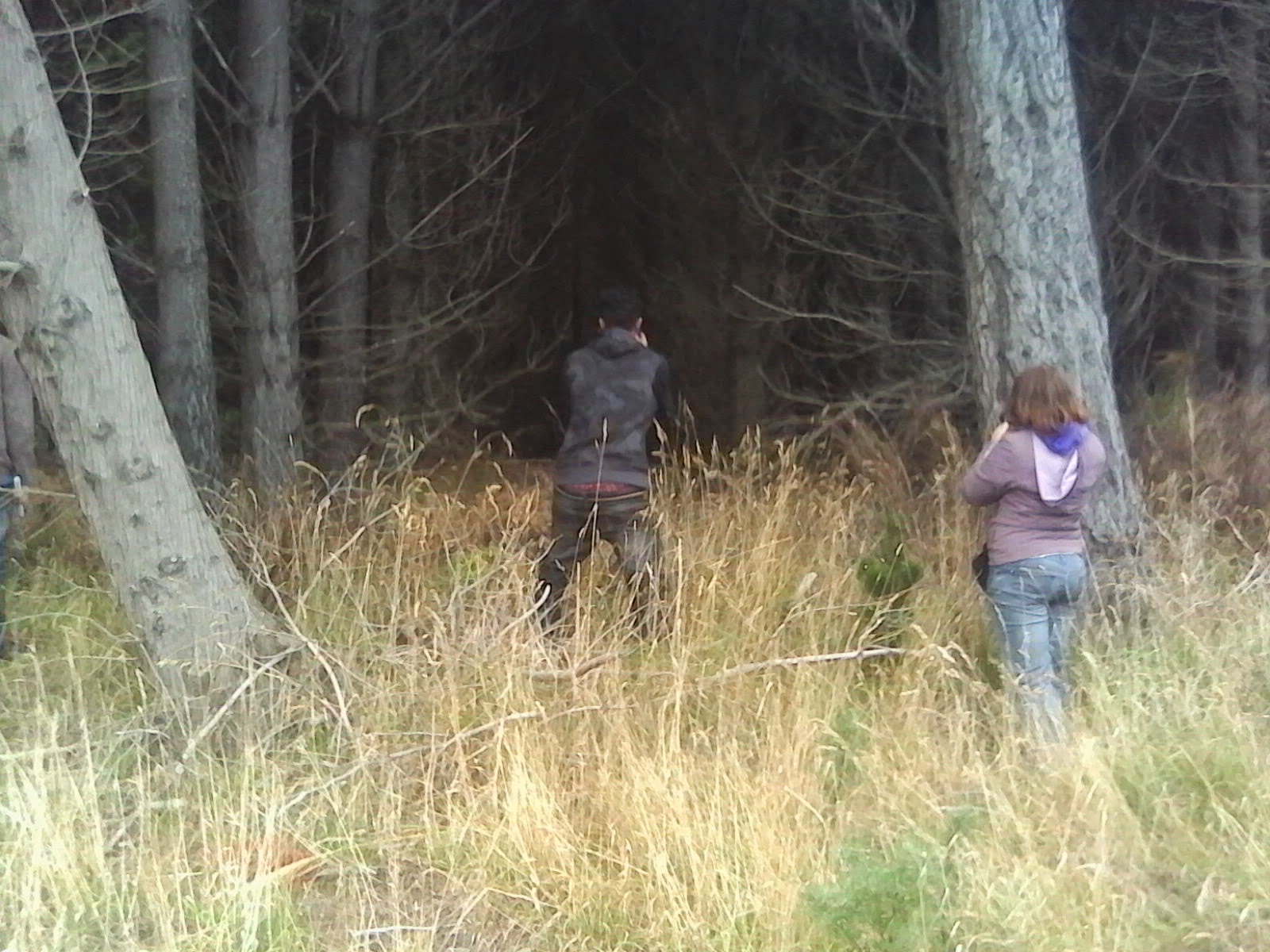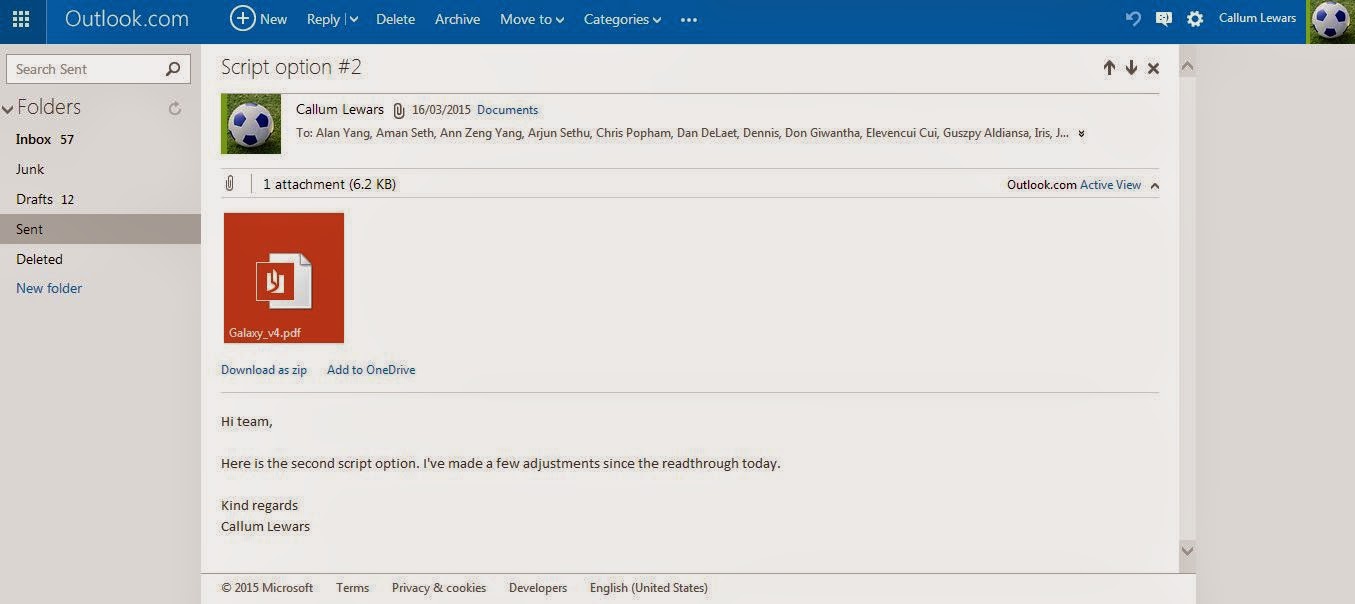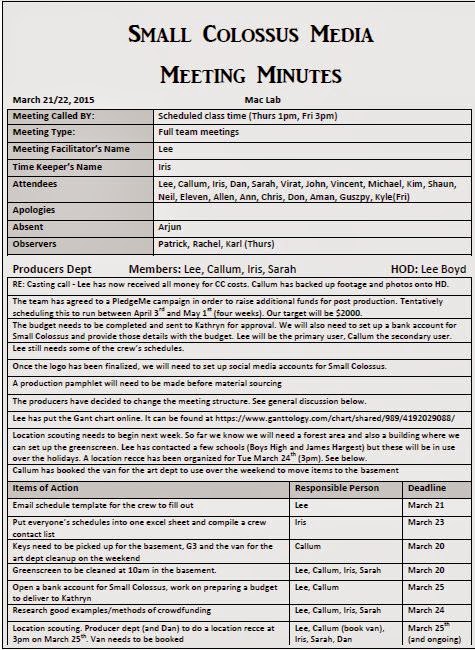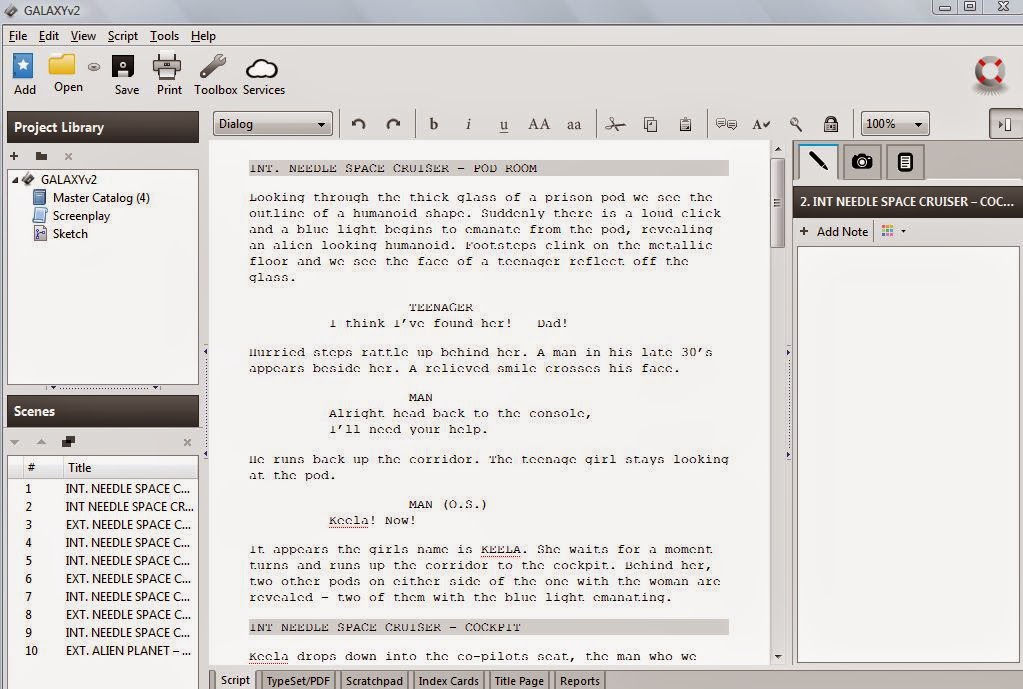Been rather busy this week, organising various parts of the production. Hard to know where to begin, so I'll just jump in wherever I see fit:
I finished the script I was working on (well, "finished" - there are still things I would like to fix up if I get time).
We had a couple of meetings at the start of the week to decide which script we should work on. So we now have a script that we are working to. My script wasn't chosen, but that's okay, I'll put 100% into the script that was chosen.
I felt like our meetings didn't run especially well this week, and I don't think they were as efficient or effective as they should have been. I decided we would need to change the way we ran them.

Firstly, I think full team meetings are fine in small doses - but we don't need them all the time. We're going to try to limit those so that people can just get on with their work and not get pulled into meetings just for the sake of it. Their time is better spent concentrating on the job. We seem to have a motivated team this year and we've seen a lot of people using their initiative and getting on with things so pulling them into too many meetings is counter-productive. We've decided that we will try just running HOD meetings for the most part, then having one (or maybe two) full team meetings a week just to update everyone on the overall progress and display what everyone has been working on. I also felt that last year the producers ended up running around after everyone and micro-managing. For the benefit of my sanity, I don't want to do that this year. I thought about it and came to the conclusion that what we need to do is to just manage the HODs, and let them manage their teams (after all, that's really the point of them being an HOD). It will save having to communicate with every member of the team individually if we can pass the info through the HODs. I really want that chain of command established by the time we get into shooting.
I also did some research on running meetings themselves to try to speed things up, and communicate more effectively so that everyone knows what they are doing and stays motivated.
Here are a few of the videos I watched on how to run meetings. It wasn't the most fun thing to do, and the production quality is pretty shocking generally, but they had good content:
I also adjusted the format of the meeting minutes so that it was clearer what actions needed to be taken, the due date and who would be responsible.
Again, coming back to the chain of command, I found a few great documents online which explain all the crew roles on a film set (including pre and post production), and the production hierarchy, so I emailed/facebooked that out to everyone (some people mentioned a week or two ago that they weren't sure what some of the roles were, so I thought this would be a good guide).
I've also had a few logistical things to sort out. Firstly, the greenscreen we will be using needed to be cleaned as it was pretty dusty (and had some bird crap on from when it was used on the last group project). Lee managed to speak to someone who knows more about greenscreens than us, and he mentioned that spot cleaning it with a damp rag should be fine. I emailed Kathryn to get permission to use the basement to roll out the greenscreen, and myself, Lee, Sarah and Iris did some cleaning. It wasn't as dirty as I thought it would be so it didn't end up taking us too long thankfully.



The art team also needed to move some things from the Tin Shed to the basement and G3, so I organised the SIT van and managed to get keys for the basement and G3 so they could do this over the weekend.


I also sent out an email to organise an HOD meeting for Monday, and to organise the pipeline test (also for Monday).
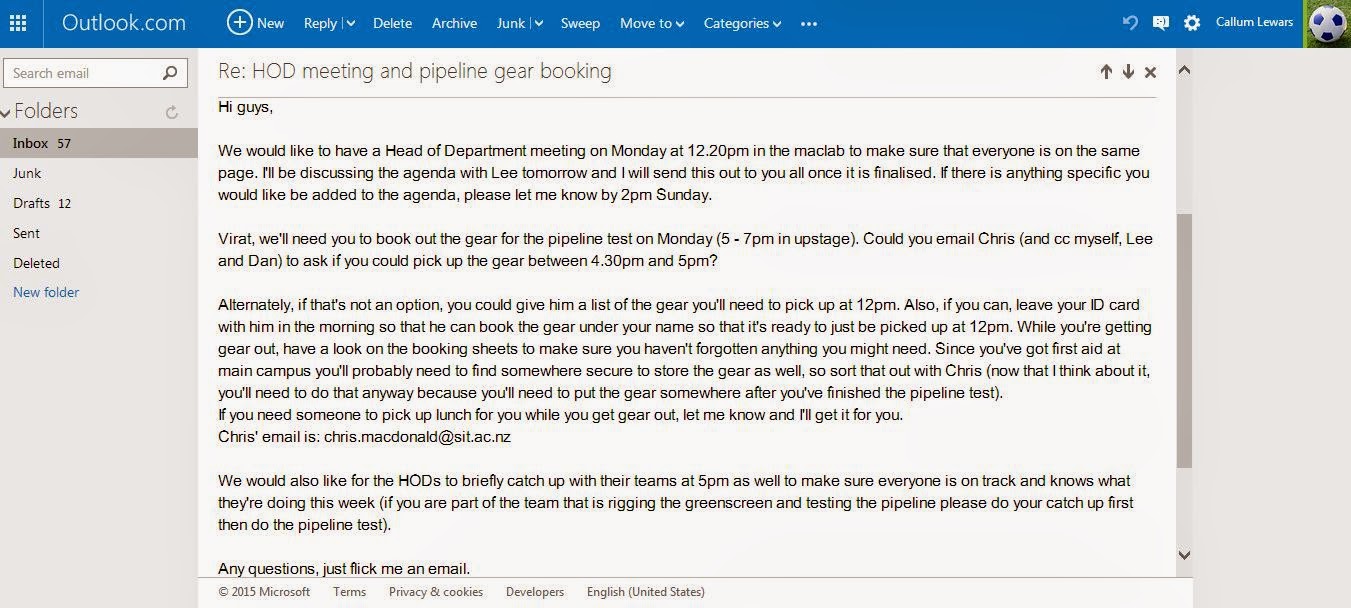
Lee and I also sat down to work on scheduling. Lee has put a Gant chart online which shows the whole production timeline, so we had to make a few alterations to that.
And yesterday we also sat down to work on the production budget. It's pretty much just an estimate at this stage as we don't have an of the breakdowns done yet, and that's probably not going to happen for a week or so. However, we know things like this can take a while to get approved, so we're trying to sort this as soon as possible. We're only three weeks from the shoot, so we'll need to start sourcing materials soon.
Another thing we have to sort soon are locations. Last year it took weeks to find a place that could accommodate the greenscreen, the ground covering, the crew, the cast and all of the gear. We've organised a location recce for Tuesday afternoon but that will mainly be for the forest locations - but the greenscreen shed is the thing that I really want to nail down as soon as possible. I've been trawling through the property sections of the Southland Express and I've actually found a number of places that could be suitable.






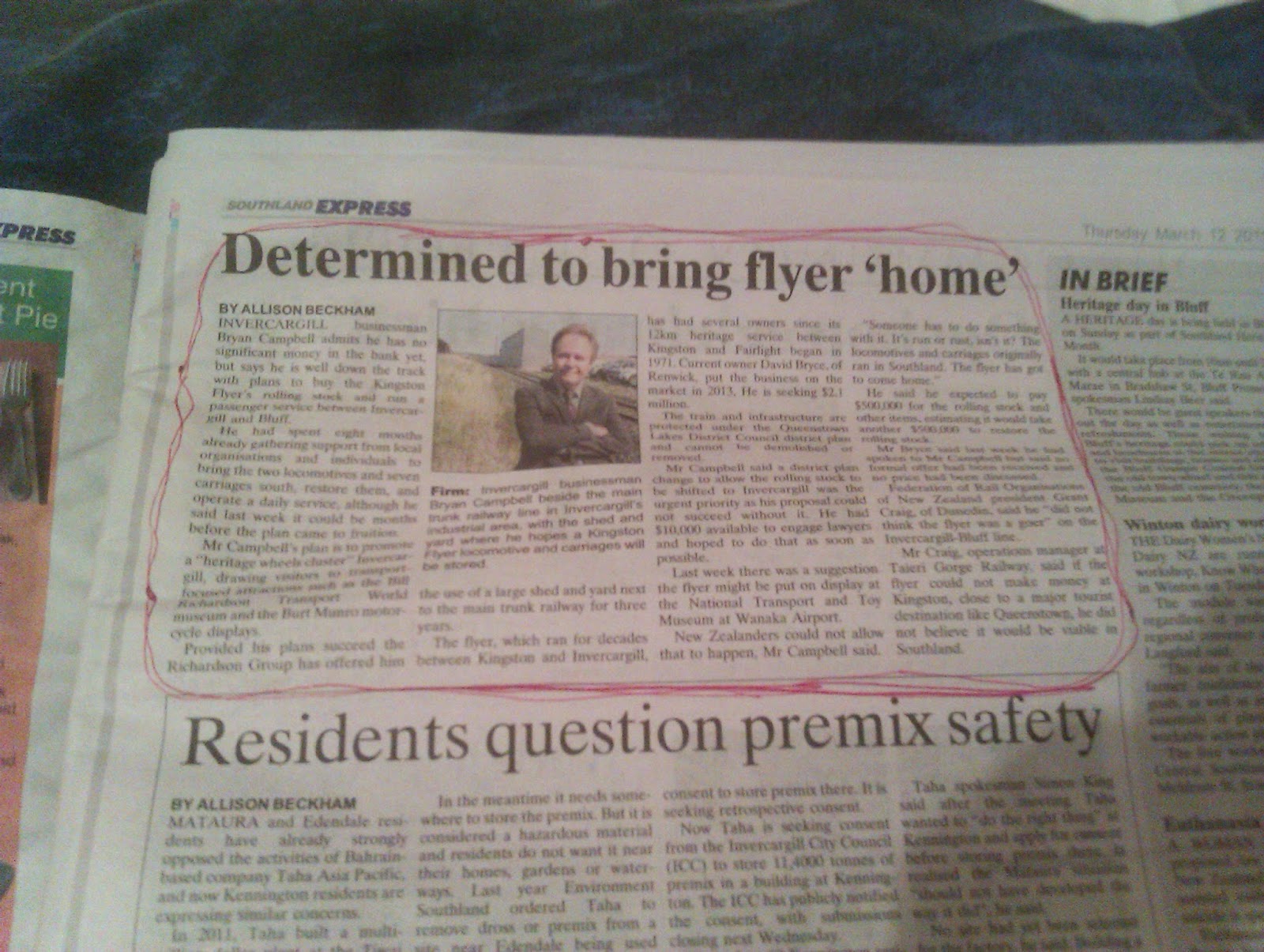

In the last two pics (above) I spotted a big shed in the background that definitely looks big enough for our needs - I'd just need to find out exactly where it is. It is right next to a railway though, so that could be a problem (unless it isn't used very much). We will probably have to do a lot of ADR anyway so that might not be a big deal.
Anyways, this might be the last time I can post for a while as I'm off on a film shoot for a couple of weeks. I'll try to blog again before I go if I have time.








